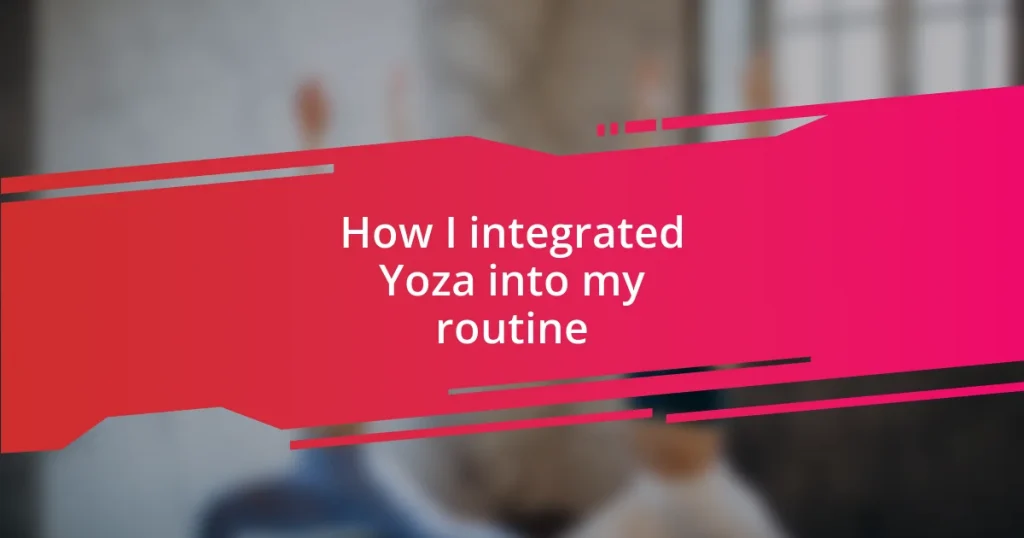Key takeaways:
- Yoza enhances focus and self-awareness, helping users eliminate distractions and recognize their productivity patterns.
- Setting realistic and gradual integration goals is crucial for sustainable use, focusing on small achievements to build confidence.
- Regular progress tracking and sharing experiences with others foster motivation and improvement, creating a supportive network for personal growth.
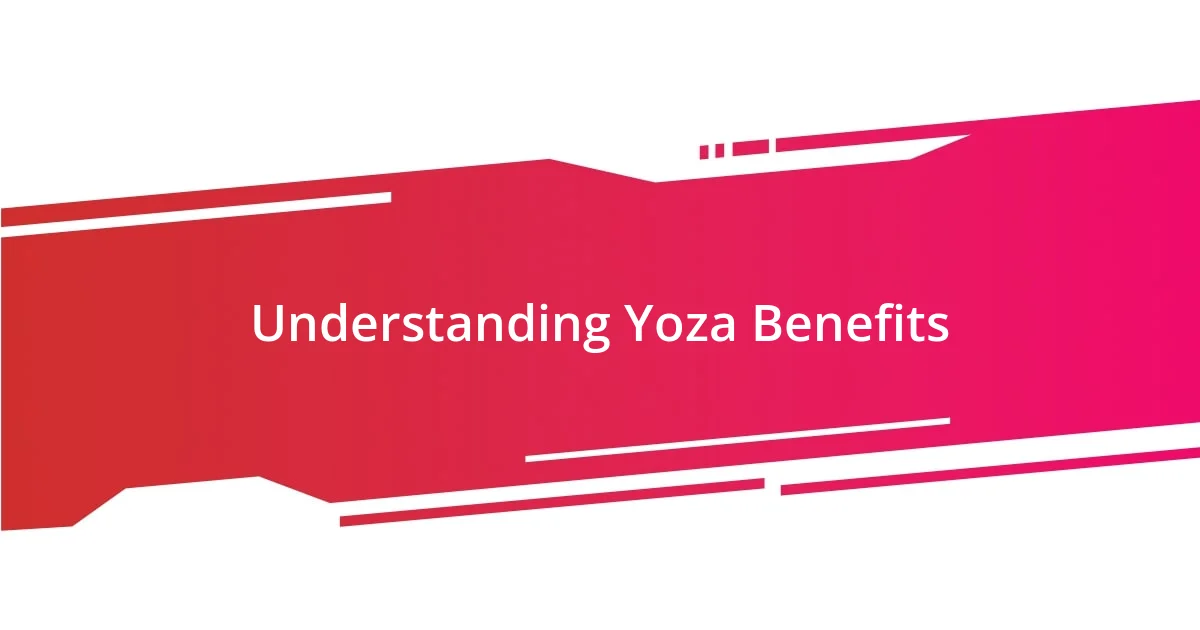
Understanding Yoza Benefits
In my journey integrating Yoza into my daily life, I quickly recognized the profound benefits it offers for enhancing focus and productivity. One busy morning, I had several tasks on my plate and felt overwhelmed. After setting a few moments aside to use Yoza, I noticed a significant shift in my concentration, as if a fog had lifted. Have you ever experienced that spark of clarity when you finally zero in on a task? That’s what Yoza does; it helps you eliminate distractions and center your thoughts.
Another remarkable advantage of Yoza is its ability to foster self-awareness. While exploring its features, I began to monitor my energy levels and productivity patterns more closely. I remember the first time I openly reflected on my own tendencies; it was eye-opening. How often do we rush through our days without really checking in with ourselves? Using Yoza has created an opportunity for me to recognize when I’m at my best and when I need to take a break, leading to more sustainable and enjoyable work sessions.
Lastly, I’ve found that Yoza encourages a sense of balance between work and relaxation, which is essential in today’s fast-paced world. I distinctly remember a weekend where I overcommitted myself to tasks and felt drained. After using Yoza to set clear boundaries for work and leisure, I felt a shift in my weekly flow. Isn’t it incredible how a simple tool can help us reclaim our time and enjoy moments of stillness? Embracing these benefits has truly reshaped the way I approach my everyday routine.
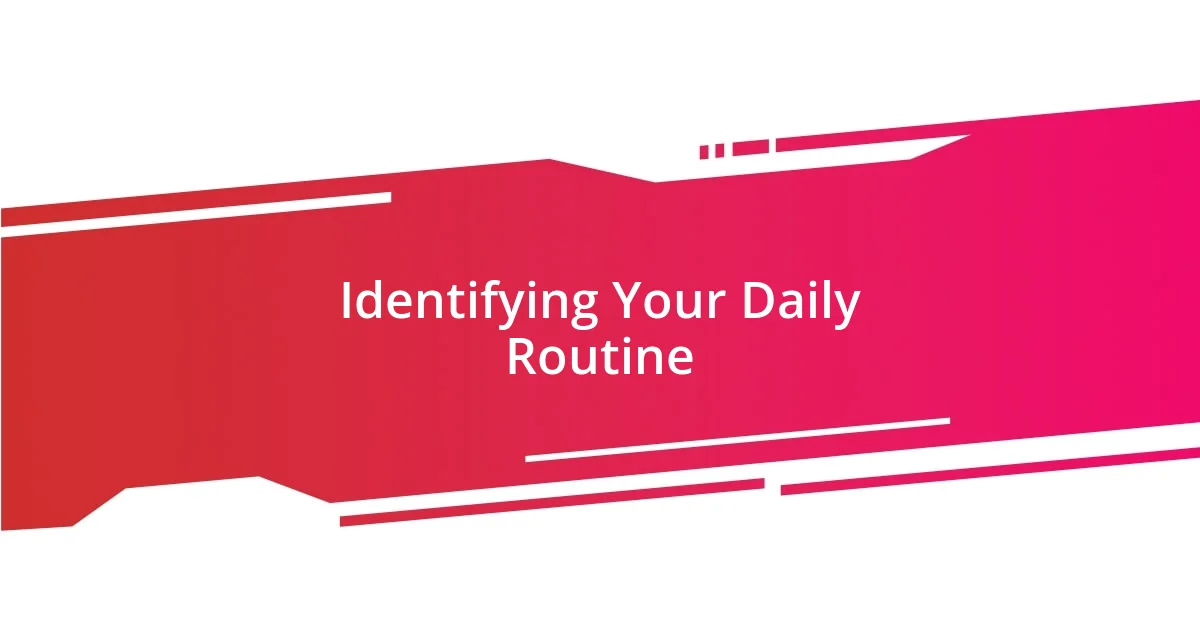
Identifying Your Daily Routine
Identifying your daily routine requires a bit of self-examination. I remember one week when I decided to jot down everything I did from morning until night. It was fascinating to see the repetitive patterns that emerged. Realizing how I spent my time led to some important adjustments. Sometimes, we fall into routines without questioning if they truly serve us.
To get a clearer picture of your daily habits, consider these steps:
- Track Your Activities: Write down what you do each hour to pinpoint time-wasters.
- Note Your Energy Levels: Observe when you feel most alert or fatigued throughout the day.
- Reflect on Your Priorities: Assess if your daily tasks align with your goals and values.
- Identify Distractions: Recognize what pulls you away from focus – social media, chatty coworkers, etc.
- Re-evaluate: Periodically revisit and adjust your routine based on your findings.
Each of these steps has helped me cultivate a routine that feels more intentional and fulfilling. It’s funny how just being aware of my actions allowed me to reclaim time that I almost thought was lost forever.
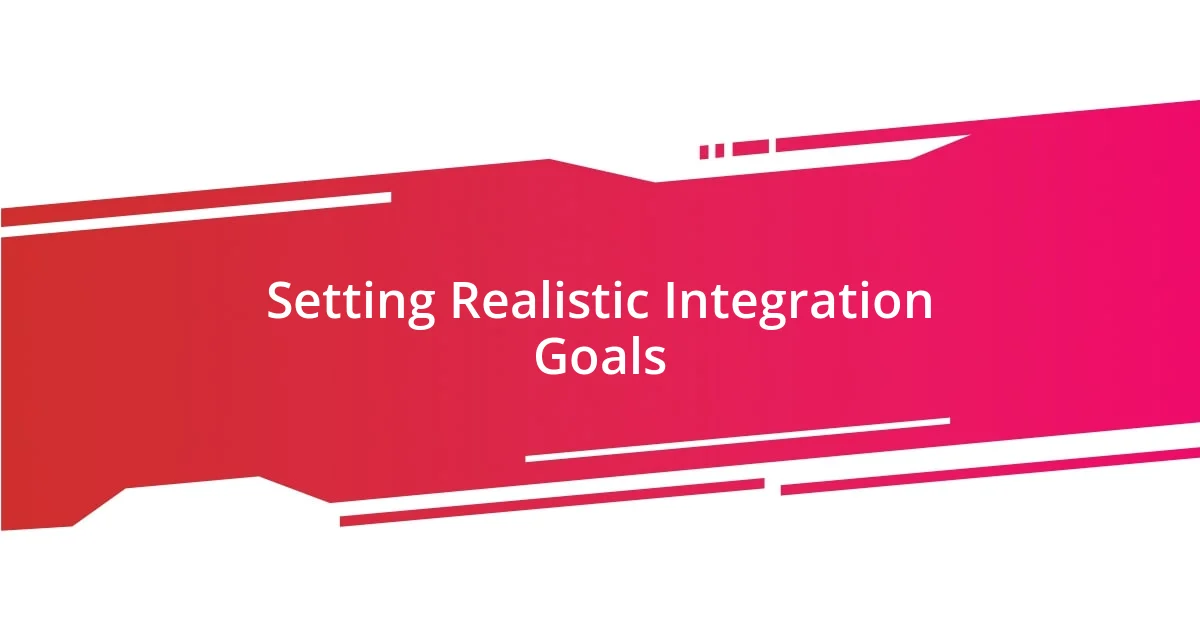
Setting Realistic Integration Goals
Setting realistic integration goals with Yoza has been a game-changer for me. Initially, I thought I could dive in and use it for hours each day, but that perspective quickly shifted. I’ve learned that starting small is key. When I began with just 10 minutes of focused use daily, I felt less overwhelmed and could gradually build my routine around the tool. Have you ever tried to change too much at once? I find that little by little really resonates better.
To make the integration smoother, I recommend identifying specific goals based on what you want to achieve with Yoza. For example, I set a goal of improving my focus during morning work sessions. The first time I hit that target, just for 30 minutes, I felt an exhilarating sense of accomplishment. Realizing how achievable such a simple goal can be made me excited to tackle the next one. It’s about creating a chain of small victories that lead to bigger changes.
Finally, be open to readjusting your goals as you determine what works best. I vividly remember an instance where I aimed too high, thinking I could increase productivity by 60% right away. Instead of feeling empowered, I felt stressed and defeated when that didn’t happen. At that moment, I chose to scale back and focus on consistency instead. From that experience, I learned to celebrate progress over perfection. So, ask yourself: what small change can you commit to today?
| Goal Type | Description |
|---|---|
| Short-term Goals | Focus on small, achievable tasks like using Yoza for 10 minutes. |
| Medium-term Goals | Increase usage gradually based on improvements in focus and self-awareness. |
| Long-term Goals | Integrate Yoza seamlessly into your routine for sustainable productivity. |
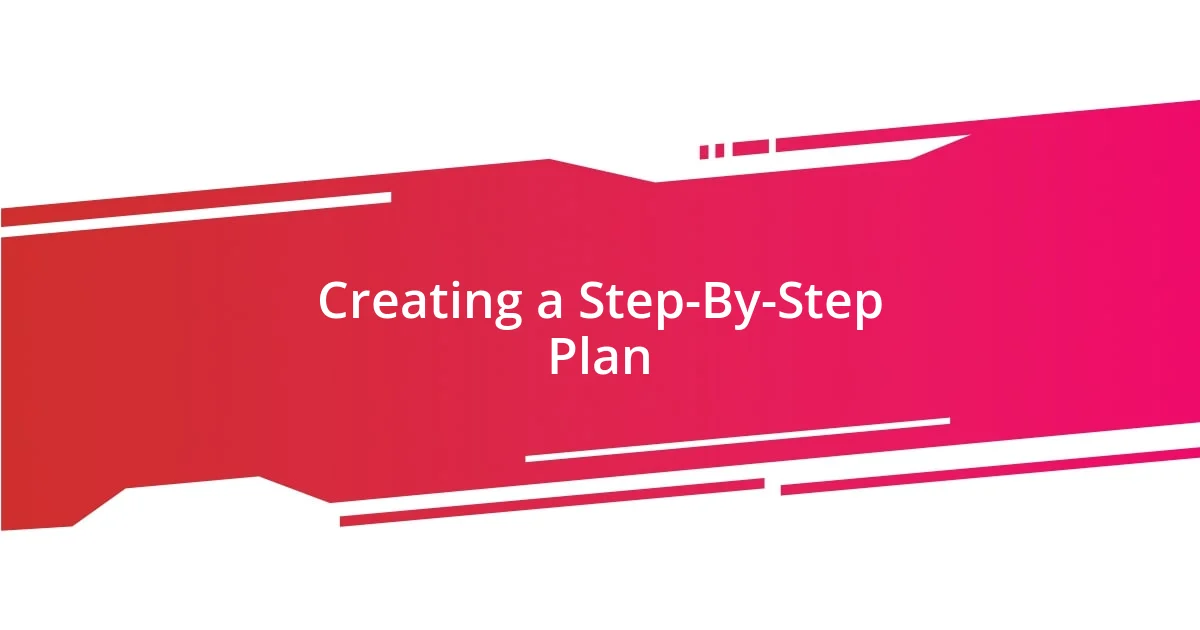
Creating a Step-By-Step Plan
Creating a step-by-step plan to integrate Yoza into my routine has been both a journey and a game of trial and error. When I first set out, I wrote down each step I wanted to take—starting with just five minutes of using Yoza each day. This breakdown made the process feel manageable. Have you ever felt daunted by big changes? I certainly have. By simplifying the first step, I didn’t just face my fears; I slowly began to build confidence in my ability to adapt.
Next, I mapped out specific actions related to my goals. For instance, I decided to pair Yoza sessions with my most challenging tasks. I vividly remember the day I tackled a particularly burdensome project after a quick Yoza warm-up. The clarity it provided was like flipping a light switch. It’s amazing how much a structured approach can impact motivation. This experience underscored how vital it is to align my step-by-step plan with my genuine productivity needs.
Lastly, I learned to iterate my plan as I went along. Initially, I thought I could jump right into longer sessions, but that backfired. Each week, I revisited my strategy, adjusting based on how easy or difficult I found the current routine. This openness to change was crucial. Isn’t fascinating how flexibility can lead to breakthroughs? Instead of feeling locked into a rigid system, I embraced a fluid approach that allowed me to pivot when necessary, turning potential setbacks into opportunities for growth.
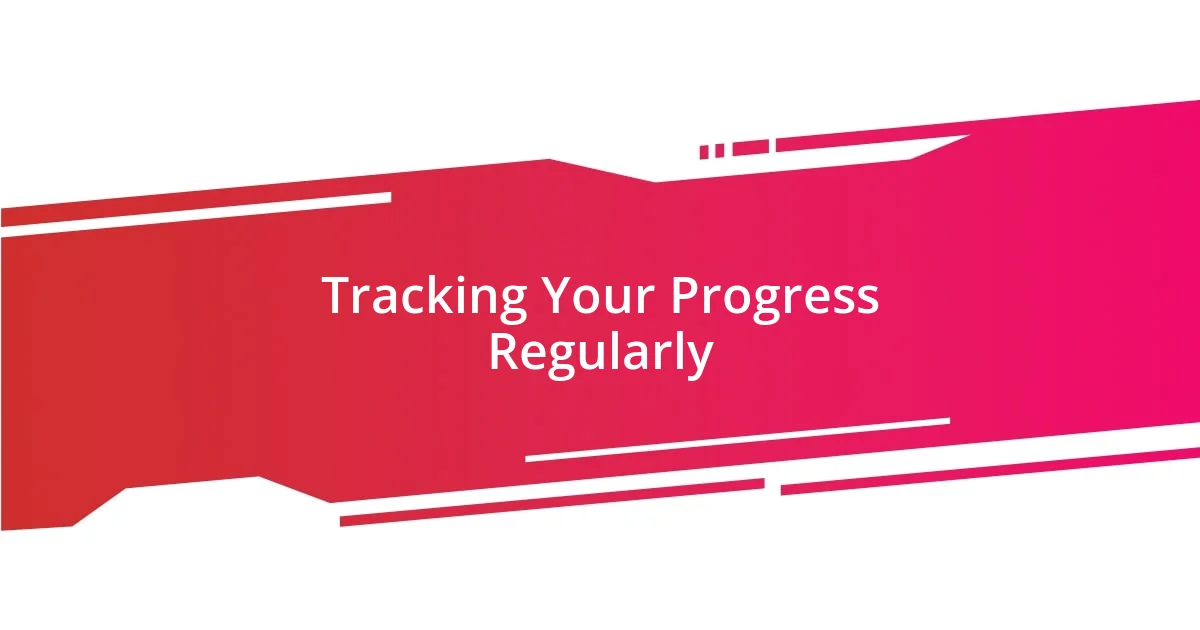
Tracking Your Progress Regularly
Tracking my progress regularly with Yoza has proven to be an insightful part of my journey. I remember those initial days when I kept a simple journal. Every time I completed a session, I noted down how I felt and what I achieved. Looking back now, it’s almost like a time capsule of my growth. Have you ever reflected on your past accomplishments? I find that tracking progress creates a sense of accountability that keeps me focused.
One method I found particularly effective is using a weekly review. At the end of each week, I dedicate a few moments to assess my usage and feelings. I ask myself, “Did I achieve my short-term goals? How did Yoza influence my productivity?” This routine has become a reflective practice that deepens my understanding of how I interact with the tool. Sometimes, the insights I gain from these reflections inspire me to tweak my sessions for better results. It’s incredible how a little self-assessment can drive motivation!
Another aspect I appreciate is celebrating milestones, no matter how small. For instance, when I consistently tracked my sessions for a month, I treated myself to a little reward. Nothing extravagant—just a favorite snack or extra downtime. This visible acknowledgment of progress becomes a little boost that fuels my ongoing commitment. Have you considered how celebrating achievements, big or small, can encourage you to stay on track? I believe it’s crucial; it transforms progress into a positive experience, making the journey feel worthwhile.
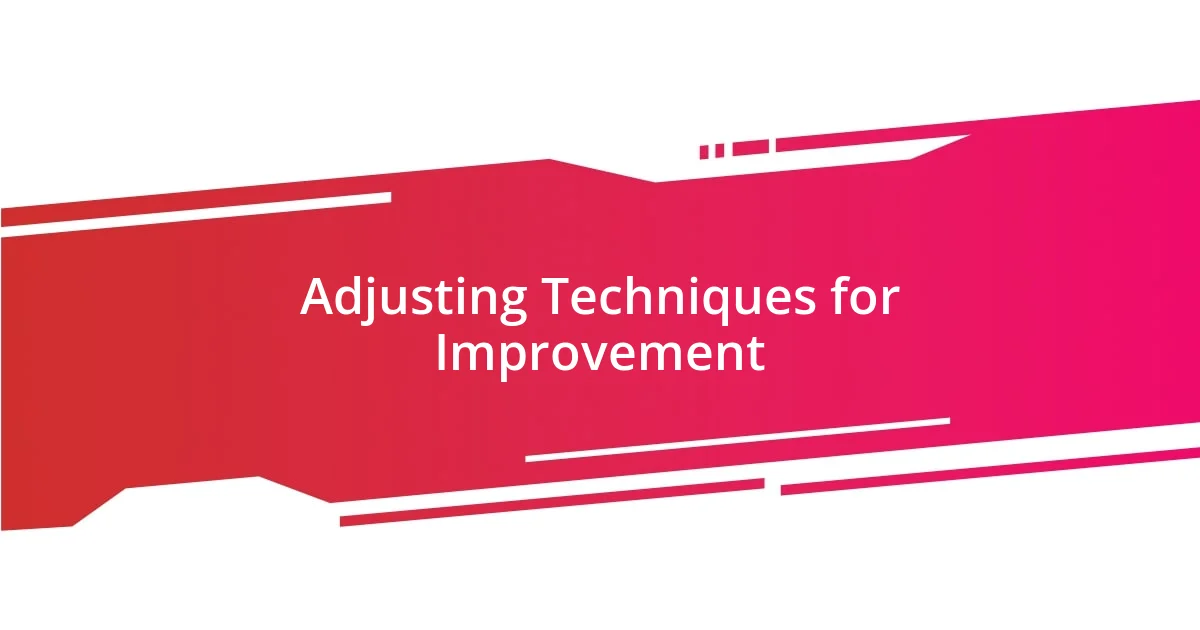
Adjusting Techniques for Improvement
Finding the right adjustments in my routine has been key to improving my experience with Yoza. Early on, I realized that time of day mattered significantly; my energy levels varied, so I experimented with morning versus evening sessions. I recall a morning when I forgot to use Yoza and felt sluggish all day. On days when I started with it, I noticed a heightened clarity that made tackling my responsibilities feel lighter. This simple observation made me question: How often do we overlook the power of timing in our routines?
Another adjustment I made was incorporating short breaks between my Yoza sessions. Initially, I dove straight in, thinking more was better. However, I quickly learned that taking a breath between tasks allowed me to digest what I’d just engaged with. There was one afternoon when I tried back-to-back sessions without any pause. I felt mentally drained and disconnected. After that experience, I began scheduling ten-minute breaks, finding they significantly enhanced my focus. It’s a reminder that sometimes stepping back can propel us forward—have you ever tried this in your own routine?
Lastly, using feedback loops has transformed my approach. I started asking for input from friends who were also on a similar journey, sharing experiences and strategies. One friend mentioned a specific technique she found effective, and I decided to give it a try. The next Yoza session felt noticeably more engaging. This showed me that collaboration amplifies improvement. Have you found that discussing your habits with others can spark new ideas? I’ve learned that the more I share, the more I grow, and that connection makes the entire process feel much more enriched.
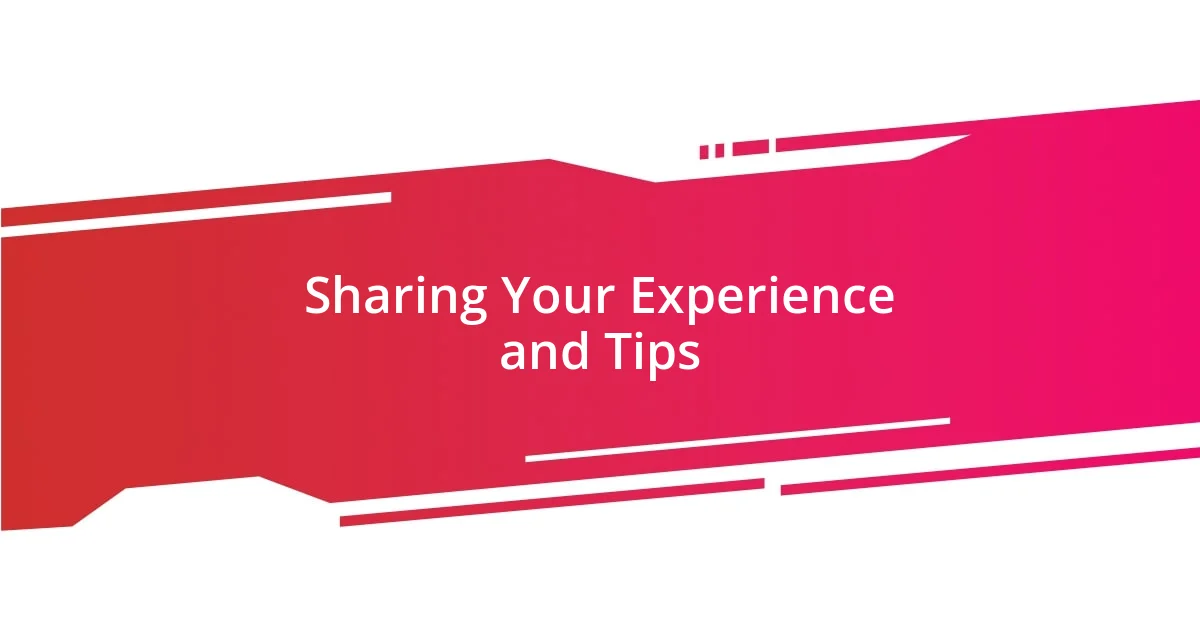
Sharing Your Experience and Tips
Sharing my experience with integrating Yoza has been enlightening, especially when I started to share my journey with others. I vividly recall the day I joined an online community centered around productivity tools. It felt like an unveiling, connecting with people who were facing similar challenges. Have you ever felt that sense of relief when realizing you’re not alone? Discussing our individual experiences not only provided me with fresh perspectives but also created a support network that heightened my commitment.
One tip I swear by is being open about my struggles. In one group chat, I shared how I was struggling with consistency, and to my surprise, many echoed my feelings. This led us to brainstorm strategies together, and one member suggested a buddy system to hold each other accountable. The next week, having someone check in on me wasn’t just motivational; it turned into a ritual I looked forward to! Engaging in these shared moments fosters a deeper connection and reminds me: Who can we lean on during our tough times?
Reflecting on what has worked for me, I discovered the importance of storytelling in our shared insights. In one session, as I recounted a particularly impactful experience with Yoza, I could see my peers nodding in agreement. This exchange of stories not only made us feel understood but also sparked creative ideas on how to enhance our routines. It’s fascinating—have you noticed how sharing our journeys can illuminate paths we hadn’t considered before? It’s a beautiful reminder of how every experience, when shared, can make our own journey feel richer and more fulfilling.










